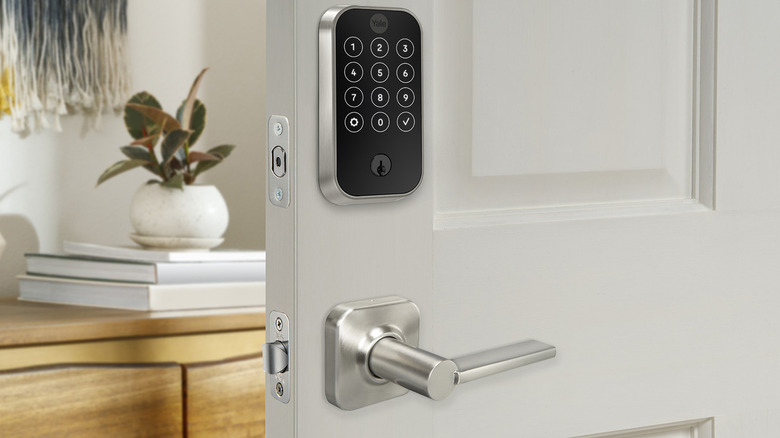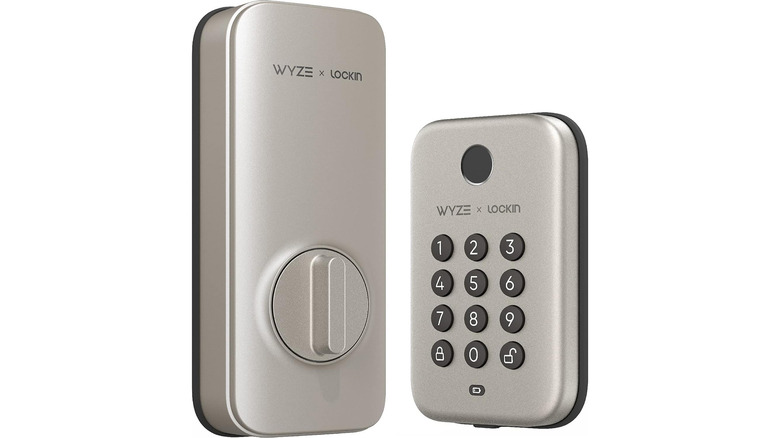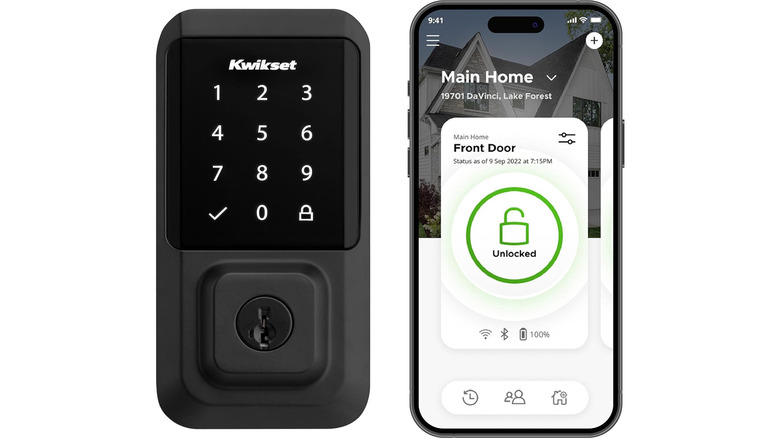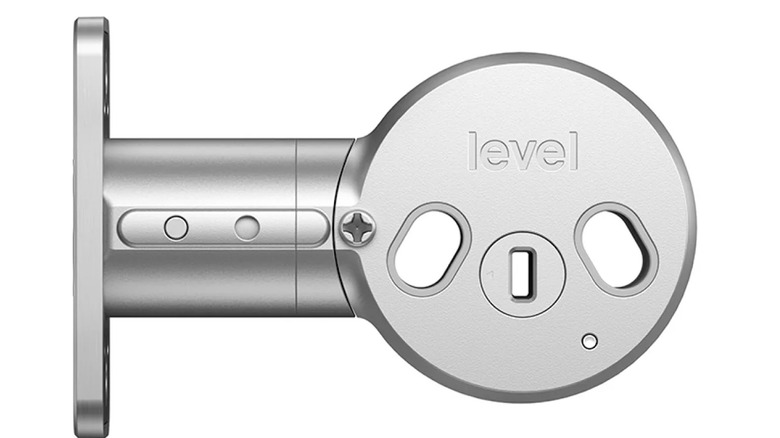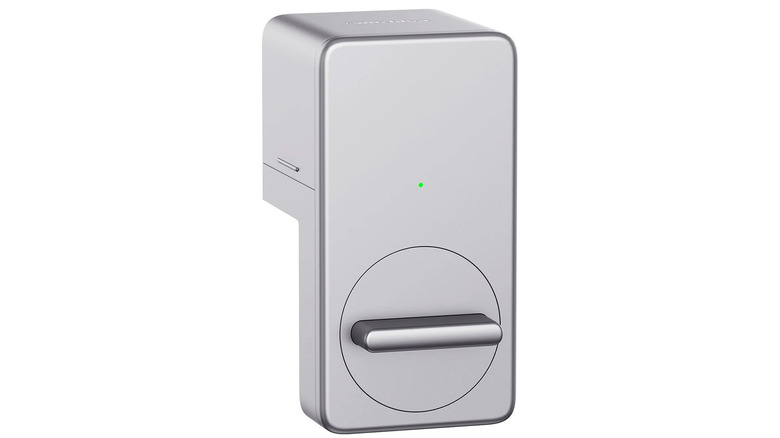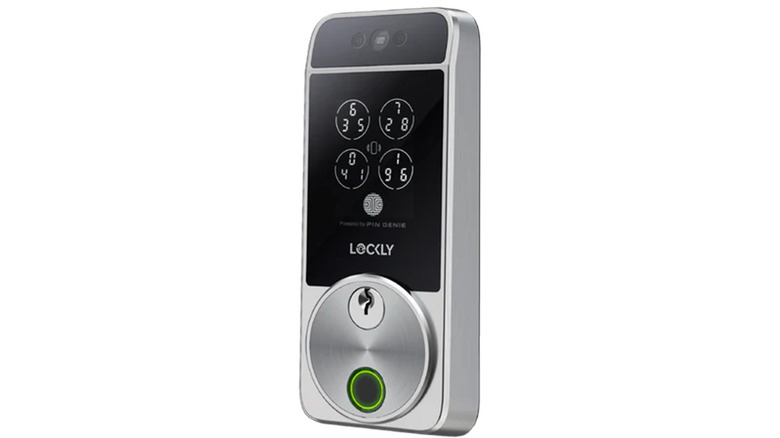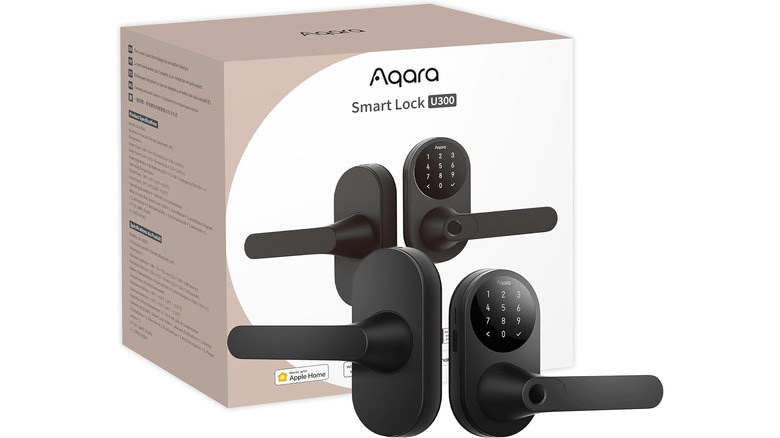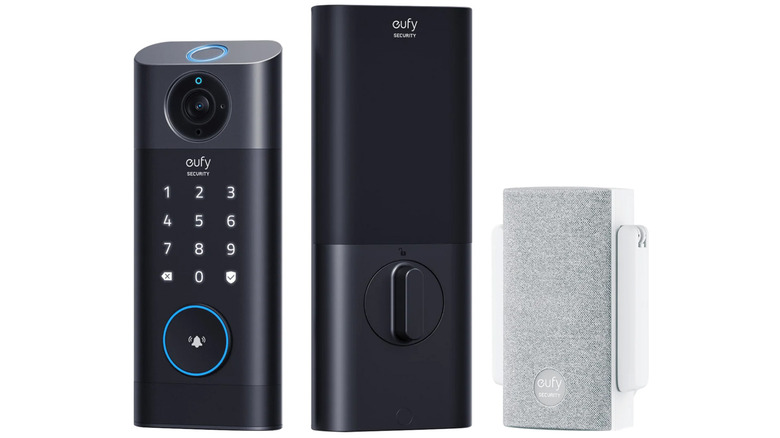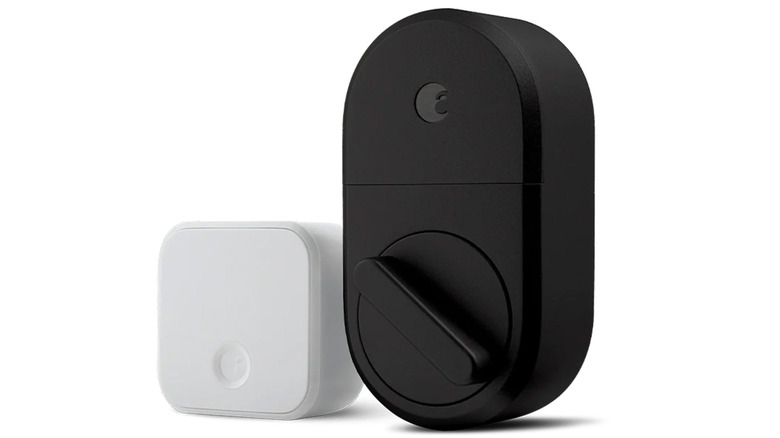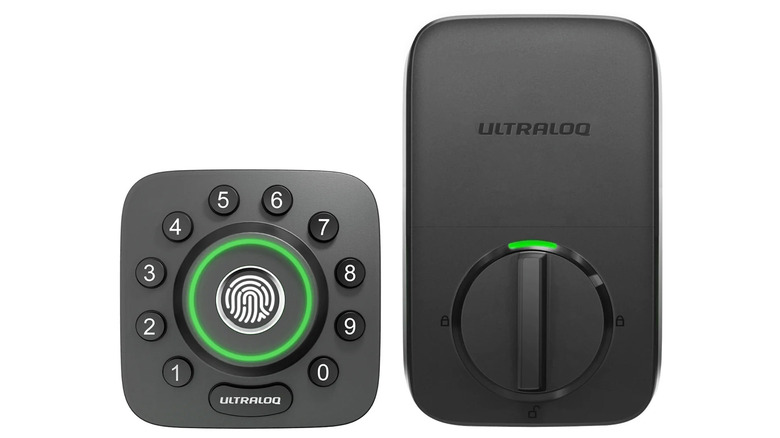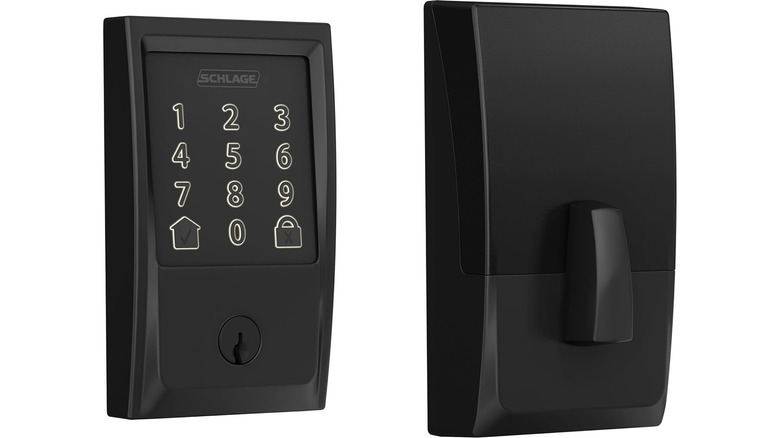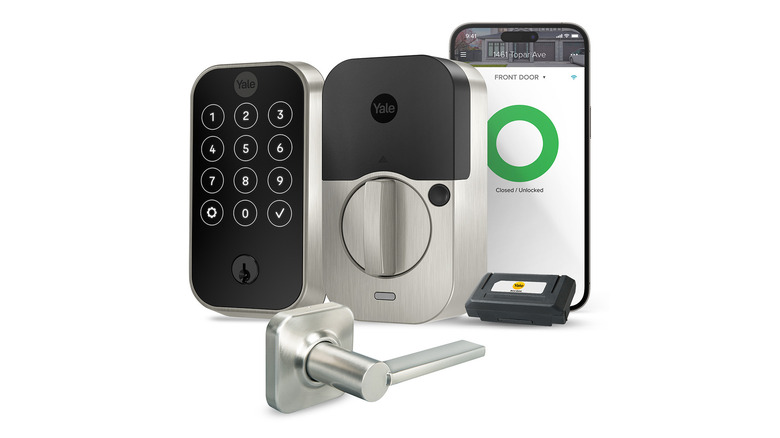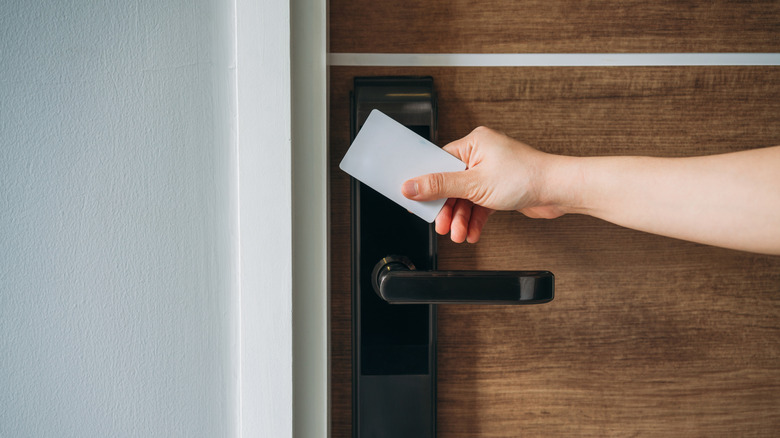Major Smart Lock Brands Ranked Worst To Best
We may receive a commission on purchases made from links.
Smart Locks are slowly becoming must-have options for smart home fans. They offer the typical deadbolt security of a regular lock while giving you multiple ways to enter your home. There are myriad benefits to this, including having a door that unlocks automatically when you or other approved people approach — the cool futuristic factor being able to unlock your house with a fingerprint like in the movies is well worth the consideration all on its own.
With the selection expanding rapidly, it's good to know who the big smart lock brands are and what their products can and can't do. Some smart lock makers give you locks with all of the extras, while others are merely fancy versions of the deadbolts you already have. The level of smart functionality is truly up to the buyer, although it's also worth noting that some manufacturers simply make superior locks to their counterparts.
There is also a pros and cons system to smart locks. Dumb locks use physical keys which are more secure in an Internet connected world, but you also have to manually remember to lock the door. Smart locks can be hacked but robbers can also pry open windows and bypass your lock entirely. So, whether or not a smart lock is a good idea really comes down to personal preference.
11. Wyze
Wyze starts the list with two options for smart locks. The first is the Auto-Lock Bolt, which is available on Amazon for around $80. It features fingerprint unlock along with a keypad, making it one of the simpler options. In addition to the unlock methods, the app lets you view who unlocks the door and when while allowing you to give guest access to people with their own code, so you know who's entering when the code is used.
The other smart lock in Wyze's lineup is often paired with other tech, such as this Wyze Lock & Video Doorbell bundle that comes with a video doorbell. This one is even simpler as it's simply a key lock with Bluetooth and Wi-Fi functionality. That makes it a decent starting point for folks who want something that still works like the old dumb locks while adding a bit of extra intelligence.
In general, both locks tend to work pretty well. They are on the less expensive side of things with simpler smart mechanics, making them good starting off points. However, Wyze has been plagued with security woes — it was revealed that 13,000 customers had their private home video feeds exposed earlier this month, and there was a database breach in 2022. These breaches didn't affect the smart locks. However, they torpedoed Wyze's security reputation among consumers, which is why the brand is at the bottom of the list.
10. Kwikset
You may know the Kwikset brand as a long-time fixture in the regular door lock space. It makes deadbolt locks, doorknobs with locks, and all kinds of other stuff. This is a company that people know. You've undoubtedly used a door with a Kwikset lock before. And the brand also makes smart locks, selling them under the Halo and Aura names.
Of the two, the Halo series locks are more advanced. They come with Wi-Fi connectivity, which means you can monitor and configure the locks on your smartphone. It also has smart home integration with Amazon, Apple, and Google, although support for all three isn't present in every lock. The smallest of the pack, the Halo Touch, looks like a basic deadbolt with a fingerprint reader but does come with all the aforementioned features. Meanwhile the Aura series is Bluetooth enabled and much simpler than the Halo brands.
In terms of quality, the market reception has been lukewarm with Kwikset. Reviewers note the laggy app performance and limited support for some smart home integrations all while being fairly expensive for what they are. And consumer reviews are less friendly, noting poor battery life and lower quality than similarly priced competitors. We tend to agree. For the price, you can do better.
9. Level
Level is an up and comer in the smart lock market with two products to talk about. The first is the Level Lock Plus, a minimalist option that omits the larger boxes of most smart locks. However, despite its small appearance, it still does what most smart locks do, with app support and an optional keypad for the outside where you can assign codes to visitors and people living with you. It is among the most aesthetically pleasing locks on the market.
The other product is the Level Smart Deadbolt which is basically the same idea but in deadbolt form. The lock is Bluetooth-enabled instead of Wi-Fi and controllable with Level's app. It's not quite as smart as some other smart locks, so it is a good mixture of old school and new school, similar to Kwikset. It's also compatible with Apple Homekit, although you'll need a hub to make it all work together. The company said that support for unified smart home standard Matter is coming, but it doesn't appear to have arrived yet.
According to reviews, the locks work okay but aren't without their flaws. Level's minimalism costs more than many of its boxier, more capable competitors, and it lacks Google Home support. Consumers have also complained that the Apple Homekit support is a finicky and that the devices drain battery quickly.
8. SwitchBot
SwitchBot is a unique brand in this space. Instead of focusing on replacing your deadbolt, it instead aims to augment your existing deadbolt with smart technology. Its hallmark product is the $130 SwitchBot Lock, which attaches to the inside of your door and over top of your existing deadbolt. You can still lock and unlock it manually, but it adds the option to do so with the app, passwords, or even NFC cards. The brand also sells a full-on smart lock that includes fingerprint and keypad support.
In general, the SwitchBot works pretty well. It's a little weird attaching a smart device to your door with two-sided tape but the ability to add (or remove) smart functionality without drilling holes or disassembling your door is kind of neat. Meanwhile, SwitchBot's actual smart lock is more like you'll see in this space where you have to install it in your door in place of the old deadbolt.
Reviewers praise the idea as the easiest way to get into smart locks without sacrificing your dumb lock but do note some bugs. Namely, the software features can be a bit finicky on occasion, such as the auto-lock forgetting to lock or unlock itself and the clunky design of both smart locks aren't winning it any design awards. The app has been updated since the reviews and now consumers consider it generally reliable.
7. Lockly
Lockly is a big player in the smart lock game. The company has over a dozen products in its lineup, and they tend to be among the higher end in terms of price and features. On the less expensive side of things, you have options like the Lockly Model 7S, a $189.99 smart lock available on Amazon that includes Bluetooth functionality, a keypad, a fingerprint reader, app support, and you have the option of using a hardware key as well. At the high end, the Lockly Vision Zeno Series adds a 2K video doorbell to the mix.
The locks all have most of the same features. They include myriad ways to unlock the door, including a hardware key in case the battery dies prematurely. The brand also boasts no subscription, which is always a nice touch but is also fairly common in the smart lock space. It's also one of the few that has support for Alexa, Google Home, and Apple Homekit along with support for Apple Home Key.
In general, Lockly locks are considered good. Consumers reference the longer battery life and the multiple options for opening the door. Pro reviews mostly echo these sentiments, but do note that not every lock has all of the features listed above. Lockly isn't perfect but it's better than many.
6. Aqara
Aqara is another up-and-comer in the smart lock space. The company has four total products and some of the most reasonable product names of any brand on the list. The least expensive option is the U50, which runs for $150 on Amazon. Then there's the U300, a smart lock with a door handle that retails for $230. Aqara's most expensive offering is the U200, a full-on Matter-infused smart lock that costs $270. In short, Aqara has enough options to make most people happy.
We'll always give a small leg up for companies that support Matter. That means it works with Apple Homekit, Google Home, and Amazon Alexa, although you will need a hub to make the most of the features. It is also worth noting that not all of Aqara's products support Matter, so you'll want to read about each individual model to make sure it fits with your existing smart home setup if you have one. Aqara's locks also come with physical keys so you won't be locked out if the battery dies.
Aqara, August, Eufy, and Lockly all have about the same reputation around the smart lock space. The products seem to work well, and consumers and pro reviewers alike generally like them with very few notable concerns. These locks work well for their category and price, but they're outmatched in small things by higher-end competition.
5. Eufy
Eufy is better known for being one of the best ring alternative doorbells brands, but it handles smart locks equally well. The brand has one of the largest selections of smart locks around, with over a dozen variants to choose from. Eufy's big claim to fame is its marriage of video doorbell and smart lock technology and several of Eufy's smart locks — including the S330, E330, and S230 — have both functions built-in by default. That could make Eufy a good option if you want to kill two birds with one stone.
The company's big marketing tactic is bragging about how many ways a customer can open its locks. Most of its locks have five methods: the app, keypad, Apple Watch, smart home assistants, or a physical key. Higher-end models like the S220 also include fingerprint support. In addition, Eufy has some of the least expensive smart locks of any brand on the list and is one of the few that offers a smart lock for under $100.
With that said, the brand isn't without its woes. The feature discrepancy between the models can be pretty big so you'll want to make sure anything you choose will work how you expect. Plus, the physical lock can't be rekeyed in the event of a lost key, which can be bothersome long term. Otherwise, the locks work quite well.
4. August
August is another big player in the smart lock space. The company only has two smart locks: the August Wi-Fi Smart Lock and the August Smart Lock + Connect. Interestingly, August also sells Yale Assure branded locks on its website since its compatible with August's smart app. August smart locks are also an excellent retrofit option since Wi-Fi Smart Lock only installs on the inside of the door, leaving your original deadbolt hardware outside.
The big thing about August is that its hardware is reasonably sized. The locks don't add massive, bulky boxes to the inside of your door. You can also upgrade the experience with add-ons like third-party keypads. For unlocking, August includes support for Apple Homekit, Google Home, and Amazon Alexa. Other than that, August's offerings are remarkably simple. The only thing of note is that the Smart Lock + Connect lock doesn't give you a physical key.
In terms of retrofits, August is arguably the best option. For the most part, the biggest complaint among pro reviewers and consumer reviews is the battery life. Other than that, and some software issues — which are fairly common among all smart locks — there isn't much to report on August. The retrofit option is the superior of the two since you get to keep a physical key and the one we recommend.
3. Ultraloq
Ultraloq sits in a respectable spot on the list as being among the best of the lesser-known brands but not quite punching with the big dogs yet. The company has two main product lineups. The first is the Latch 5, which is a smart level lock that replaces your door handle and the U-Bolt series that is a more standard smart lock. The company bills itself on convenience and has several neat little features that many locks don't have.
For example, the anti-peep feature lets you type in random digits before and after your passcode and can recognize that you typed in the correct code with a bunch of extra junk to keep prying eyes from seeing your code. These appear to be available on all products. What else you get depends on your lock. The U-Bolt series has a fingerprint reader while the regular Bolt Fingerprint has a fingerprint reader and a physical keylock in addition to its keypad. The Bolt NFC and Latch 5 NFC also support tap-to-unlock, with is less common in smart locks.
Ultraloq is surprisingly well regarded among both consumers and reviewers. Most complaints are software-related and date back two or three years and several firmware updates ago. The only other potential issue is battery life. Ultraloq says its batteries need to be replaced every three to six months, but some folks report battery life not lasting quite that long.
2. Schlage
Schlage is where we start to get into the top end of smart locks. The brand has a few smart locks and most of them are fairly well regarded. Schlage's claim to fame is its distinctive keypad design, which looks like something you'd see in a bank rather than a front door. Schlage is also an official partner of Amazon Alexa and Ring. Ring doesn't make its own smart locks and instead directs you to buy Schlage products. The company's locks also support Google Assistant.
What you see is what you get when it comes to Schlage locks. Each one comes with a rekeyable hardware key lock along with a keypad for manual entry. Each also officially supports Ring integration, so you can control your lock from the Ring app just like other Ring products. The Schlage Encode Plus also works with Apple Home Key if you want to unlock your house with your iPhone or Apple Watch.
Schlage has one of the best reputations in the industry and often goes toe to toe with big dogs like Yale. It doesn't offer every smart feature and its selection is a little a small selection, but the only real complaint we were able to find is that the battery life is simply mediocre. Schlage locks take four AA batteries, and the company estimates that you have to replace them about every six months.
1. Yale
Yale is a lot like Kwikset. It's been making door locks, handles, and deadbolts since 1840 and it jumped into the smart lock segment as soon as it could. As such, Yale has one of the largest selections of smart locks of any brand with dozens of options to choose from. Options may also include things like replacement door levers, handles, or knobs to help match the hardware together. That's something you don't find often in the smart lock space as most options are either white, black, or a basic metallic finish.
Fortunately, Yale also puts enough smart tech in its locks to make them feel good. You get the standard rekeyable keys and keypad. Depending on which model you choose, you also get a fingerprint reader, app support, and some other goodies like auto-unlock when it detects you're coming and virtual keys you can share with people like babysitters or dog walkers that you can revoke when they're not needed. Locks also have Amazon Alexa, Google Home, and Apple Home Key support.
As far as we can tell, there are no significant issues with these locks. Battery life tends to be a little on the shorter side and the low battery warning doesn't tick on as early as some people would like. Other than that, and some small software foibles, there isn't really anything wrong with Yale locks. Yale, Schlage, and Ultraloq could easily swap places on this list so those are arguably the top three options.
Methodology
Smart locks are difficult to judge because there are so many different types that do different things. For this list, we focused on a few primary data points and then augmented based on a few others. For starters, people have to actually like these locks, so we consulted both professional reviews from a variety of sites and consumer reviews from a handful of forums. After all, even if they work okay, if people hate them it makes no sense to recommend them.
From there, organization depended on several factors, including price of the least and most expensive locks in the company's portfolio, the size of the company's portfolio, and the available smart features. After all, a smart lock that supports Matter and, thus, every smart assistant is much better than one that uses older protocols and only supports one or two. Locks that had physical keys also got a bump because dead batteries is a bad reason to be locked out of your house.
Some other things we took into consideration include pro review scores, consumer reviews and opinions, and aesthetics. For example, Yale's ability to sell door handles that match its smart locks perfectly gave it a slight leg up on Schlage and Ultraloq, which do not. These factors were all taken into consideration and the list above is the result of that.
